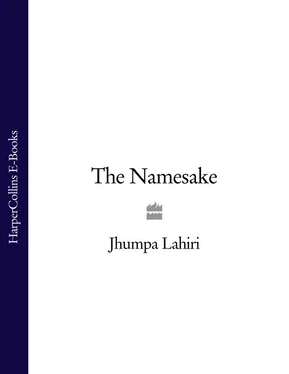After two years in an overheated university-subsidized apartment, Ashima and Ashoke are ready to purchase a home. In the evenings, after dinner, they set out in their car, Gogol in the back seat, to look at houses for sale. They do not look in the historic district, where the chairman of Ashoke’s department lives, in an eighteenth-century mansion to which he and Ashima and Gogol are invited once a year for Boxing Day tea. Instead they look on ordinary roads where plastic wading pools and baseball bats are left out on the lawns. All the houses belong to Americans. Shoes are worn inside, trays of cat litter are placed in the kitchens, dogs bark and jump when Ashima and Ashoke ring the bell. They learn the names of the different architectural styles: cape, saltbox, raised ranch, garrison. In the end they decide on a shingled two-story colonial in a recently built development, a house previously occupied by no one, erected on a quarter acre of land. This is the small patch of America to which they lay claim. Gogol accompanies his parents to banks, sits waiting as they sign the endless papers. The mortgage is approved and the move is scheduled for spring. Ashoke and Ashima are amazed, when moving by U-Haul to the new house, to discover how much they possess; each of them had come to America with a single suitcase, a few weeks’ worth of clothes. Now there are enough old issues of the Globe stacked in the corners of the apartment to wrap all their plates and glasses. There are whole years of Time magazine to toss out.
The walls of the new house are painted, the driveway sealed with pitch, the shingles and sun deck weatherproofed and stained. Ashoke takes photographs of every room, Gogol standing somewhere in the frame, to send to relatives in India. There are pictures of Gogol opening up the refrigerator, pretending to talk on the phone. He is a sturdily built child, with full cheeks but already pensive features. When he poses for the camera he has to be coaxed into a smile. The house is fifteen minutes from the nearest supermarket, forty minutes from a mall. The address is 67 Pemberton Road. Their neighbors are the Johnsons, the Mertons, the Aspris, the Hills. There are four modest bedrooms, one and a half bathrooms, seven-foot ceilings, a one-car garage. In the living room is a brick fireplace and a bay window overlooking the yard. In the kitchen there are matching yellow appliances, a lazy Susan, linoleum made to look like tiles. A watercolor by Ashima’s father, of a caravan of camels in a desert in Rajasthan, is framed at the local print shop and hung on the living room wall. Gogol has a room of his own, a bed with a built-in drawer in its base, metal shelves that hold Tinkertoys, Lincoln Logs, a View-Master, an Etch-A-Sketch. Most of Gogol’s toys come from yard sales, as does most of the furniture, and the curtains, and the toaster, and a set of pots and pans. At first Ashima is reluctant to introduce such items into her home, ashamed at the thought of buying what had originally belonged to strangers, American strangers at that. But Ashoke points out that even his chairman shops at yard sales, that in spite of living in a mansion an American is not above wearing a pair of secondhand pants, bought for fifty cents.
When they first move into the house, the grounds have yet to be landscaped. No trees grow on the property, no shrubs flank the front door, so that the cement of the foundation is clearly visible to the eye. And so for the first few months, four-year-old Gogol plays on an uneven, dirt-covered yard littered with stones and sticks, soiling his sneakers, leaving footprints in his path. It is among his earliest memories. For the rest of his life he will remember that cold, overcast spring, digging in the dirt, collecting rocks, discovering black and yellow salamanders beneath an overturned slab of slate. He will remember the sounds of the other children in the neighborhood, laughing and pedaling their Big Wheels down the road. He will remember the warm, bright summer’s day when the topsoil was poured from the back of a truck, and stepping onto the sun deck a few weeks later with both of his parents to see thin blades of grass emerge from the bald black lawn.
In the beginning, in the evenings, his family goes for drives, exploring their new environs bit by bit: the neglected dirt lanes, the shaded back roads, the farms where one could pick pumpkins in autumn and buy berries sold in green cardboard boxes in July. The back seat of the car is sheathed with plastic, the ashtrays on the doors still sealed. They drive until it grows dark, without destination in mind, past hidden ponds and graveyards, culs-de-sac and dead ends. Sometimes they drive out of the town altogether, to one of the beaches along the North Shore. Even in summer, they never go to swim or to turn brown beneath the sun. Instead they go dressed in their ordinary clothes. By the time they arrive, the ticket collector’s booth is empty, the crowds gone; there is only a handful of cars in the parking lot, and the only other visitors are people walking their dogs or watching the sun set or dragging metal detectors through the sand. Together, as the Gangulis drive, they anticipate the moment the thin blue line of ocean will come into view. On the beach Gogol collects rocks, digs tunnels in the sand. He and his father wander barefoot, their pant legs rolled halfway up their calves. He watches his father raise a kite within minutes into the wind, so high that Gogol must tip his head back in order to see, a rippling speck against the sky. Snowy gulls hover with wings spread, low enough to touch. The wind whips around their ears, turning their faces cold. Gogol darts in and out of the ocean, making faint, temporary footprints, soaking his rolled-up cuffs. His mother cries out, laughing, as she lifts her sari a few inches above her ankles, her slippers in one hand, and places her feet in foaming, ice-cold water. She reaches out to Gogol, takes his hand. “Not so far,” she tells him. The waves retract, gathering force, the soft, dark sand seeming to shift away instantly beneath their feet, causing them to lose their balance. “I’m falling. It’s pulling me in,” she always says.
The August that Gogol turns five, Ashima discovers she is pregnant again. In the mornings she forces herself to eat a slice of toast, only because Ashoke makes it for her and watches her while she chews it in bed. Her head constantly spins. She spends her days lying down, a pink plastic wastepaper basket by her side, the shades drawn, her mouth and teeth coated with the taste of metal. She watches The Price Is Right and Guiding Light and The $10,000 Pyramid on the television Ashoke moves in from the living room to her side of the bed. Staggering out to the kitchen at lunchtime, to prepare a peanut butter and jelly sandwich for Gogol, she is revolted by the odor of the fridge, convinced that the contents of her vegetable drawers have been replaced with garbage, that meat is rotting on the shelves. Sometimes Gogol lies beside her in his parents’ bedroom, reading a picture book, or coloring with crayons. “You’re going to be an older brother,” she tells him one day. “There’ll be someone to call you Dada. Won’t that be exciting?” Sometimes, if she is feeling energetic, she asks Gogol to go and get a photo album, and together they look at pictures of Gogol’s grandparents, and his uncles and aunts and cousins, of whom, in spite of his one visit to Calcutta, he has no memory. She teaches him to memorize a four-line children’s poem by Tagore, and the names of the deities adorning the ten-handed goddess Durga during pujo: Saraswati with her swan and Kartik with his peacock to her left, Lakshmi with her owl and Ganesh with his mouse to her right. Every afternoon Ashima sleeps, but before nodding off she switches the television to Channel 2, and tells Gogol to watch Sesame Street and The Electric Company , in order to keep up with the English he uses at nursery school.
Читать дальше












